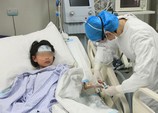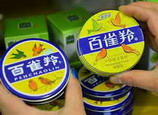
The US Treasury Department said Friday that the yuan remains "significantly undervalued," but Chinese experts pointed out Sunday that the currency has jumped 30 percent against the US dollar since China launched exchange rate reform in 2005.
In a report to Congress on International Economic and Exchange Rate Policies, the US Treasury noted that China has taken measures to liberalize controls on capital movements to achieve a goal of a more flexible exchange rate regime, but said the currency is still undervalued and should be strengthened further.
The yuan traded at a peak of 6.2506 against the US dollar on China's spot currency market Friday, the highest level since the exchange rate reform program began.
The central government started to ease some controls on the yuan's price in 2005 and pegged it against a basket of foreign currencies rather than the dollar alone.
"The real effective exchange rate of the yuan has already jumped around 30 percent (since 2005), and has reached a level of equilibrium," Wang Jun, deputy director of the Consulting Research Department at the China Center for International Economic Exchanges, a government think tank, told the Global Times Sunday.
Wang attributed the appreciation of the yuan to the fast growth of China's economy, the US policy of quantitative easing, and international investors' confidence in the Chinese currency.
"The yuan will possibly strengthen slightly further in 2013, due to growing foreign exchange reserves," Liu Dongliang, a senior analyst at China Merchants Bank, told the Global Times Sunday.
However, there is not much room for significant appreciation in the long term, Liu also noted.
China's foreign exchange reserves stood at $3.44 trillion at the end of March, up $130 billion from the end of December, the biggest quarterly increase since the second quarter of 2011, the central bank said Thursday.
Since the start of 2012, many top officials, including former Chinese Premier Wen Jiabao and Zhou Xiaochuan, the governor of the central bank, have stated that the value of the yuan is approaching equilibrium.
"The central government needs to continue exchange rate reform and allow the currency to fluctuate in a wider range," Wang said, adding that a constant appreciation would seriously impact China's foreign trade.
"Some Chinese export-oriented enterprises have already experienced a difficult time during the period of fast appreciation of the yuan," Wang noted.
The General Administration of Customs (GAC) reported Wednesday a trade deficit of $884 million in March as a surge in imports exceeded growth of exports.
Exports rose by 10 percent year-on-year in March, down from the 21.8 percent growth in February, according to the GAC.
The recent appreciation of the yuan could lead to a further slowdown in export growth in the next two months, said Liu of China Merchants Bank.
















 Bird flu takes toll on poultry industry
Bird flu takes toll on poultry industry


![]()
